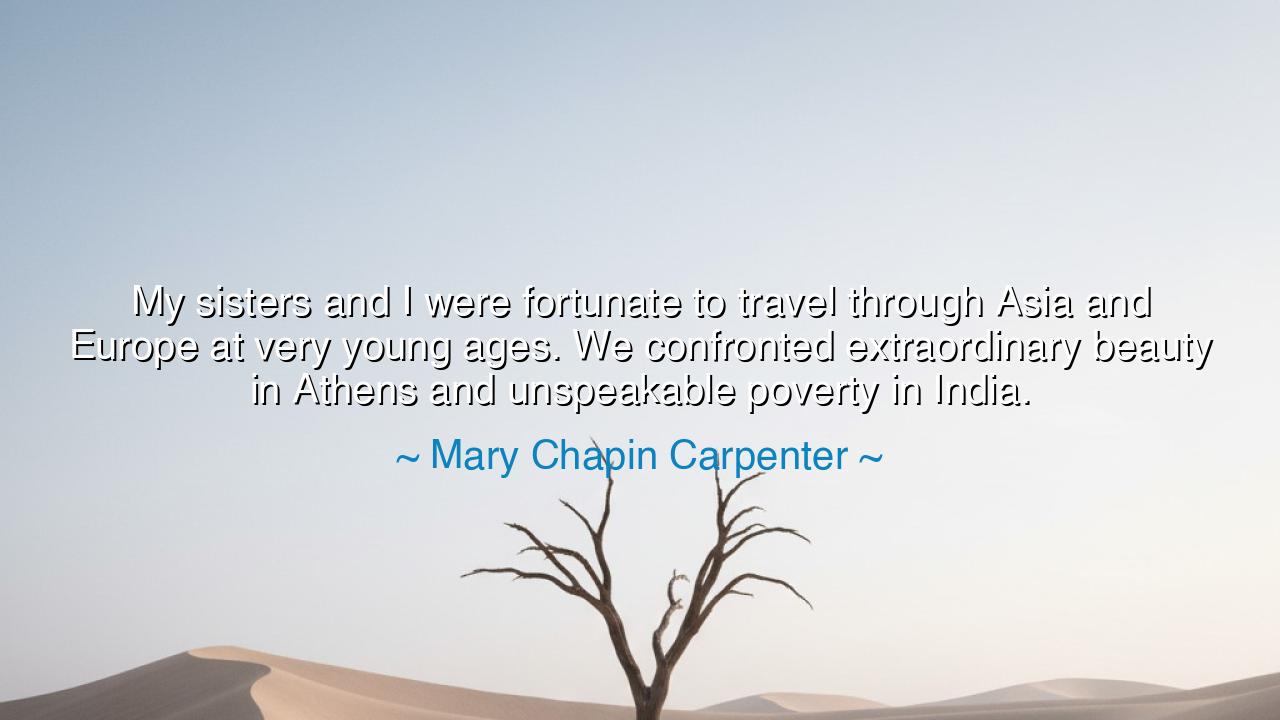
My sisters and I were fortunate to travel through Asia and
My sisters and I were fortunate to travel through Asia and Europe at very young ages. We confronted extraordinary beauty in Athens and unspeakable poverty in India.






Mary Chapin Carpenter, in words both tender and profound, once said: “My sisters and I were fortunate to travel through Asia and Europe at very young ages. We confronted extraordinary beauty in Athens and unspeakable poverty in India.” Within this reflection lies the double-edged truth of human experience: that the world holds both splendor and suffering, majesty and misery, often side by side, teaching the traveler not only to see but to feel, not only to admire but to understand.
In speaking of Athens, Carpenter invokes the eternal city, cradle of philosophy and democracy, where marble temples gleam against the sky and history breathes through every stone. To gaze upon such beauty at a young age is to glimpse the heights of human creation—the power of the mind and the hand united in harmony. Athens represents the pinnacle of what man can achieve when guided by wisdom, artistry, and vision. It is the reminder that human beings, though frail, are also creators of wonders that endure beyond centuries.
Yet her words do not linger in beauty alone. She speaks also of India, not in its grandeur of culture and spirit, but in its unspeakable poverty—the shadow that balances the light. To witness destitution in youth is to have the veil torn away early, to be confronted with suffering that cannot be ignored. Here, the lesson is not triumph, but humility; not pride, but compassion. For the same earth that produces temples of stone also bears streets where children hunger. The young traveler, in beholding both, awakens to the fullness of reality.
The ancients themselves knew this paradox. Consider the tale of Siddhartha, who would become the Buddha. Born into luxury, he was shielded from sorrow until one day he left his palace and saw the sick, the old, and the dying. In that moment, his heart was broken open, and he began his quest for enlightenment. Carpenter’s words echo this same journey: that the path to wisdom begins when one sees both the brightness of extraordinary beauty and the darkness of unspeakable poverty.
From this paradox emerges the call to balance. If one only beholds beauty, one may grow arrogant, blind to suffering. If one only beholds poverty, one may despair and forget the majesty of the human spirit. But to witness both together is to gain vision. The traveler who has seen both Athens and India is marked forever, knowing that the world is both gift and burden, both creation and collapse, both joy and grief. Such vision can ignite compassion, responsibility, and a hunger to bring more balance into the world.
Therefore, the lesson is this: do not travel to be entertained alone, but to be transformed. Seek not only the palaces and monuments, but also the hidden alleys, the faces of the poor, the voices of the forgotten. In doing so, you will become not a mere wanderer, but a witness, carrying in your soul the full truth of the human condition. Let beauty inspire you, let suffering humble you, and let both guide you toward greater mercy and wisdom.
So I say unto you, O children of the road: when you set forth upon your journeys, let your eyes remain open to the extraordinary beauty and the unspeakable poverty alike. Do not turn away from either, for both are teachers. The marble columns will remind you of humanity’s greatness; the hungry child will remind you of your duty. And together, these truths will shape a heart not of stone, but of strength and compassion.
Thus, remember Mary Chapin Carpenter’s words, for in them lies a sacred teaching: to travel is to see the full face of the world, both radiant and scarred. And to see it truly is the beginning of wisdom.






AAdministratorAdministrator
Welcome, honored guests. Please leave a comment, we will respond soon